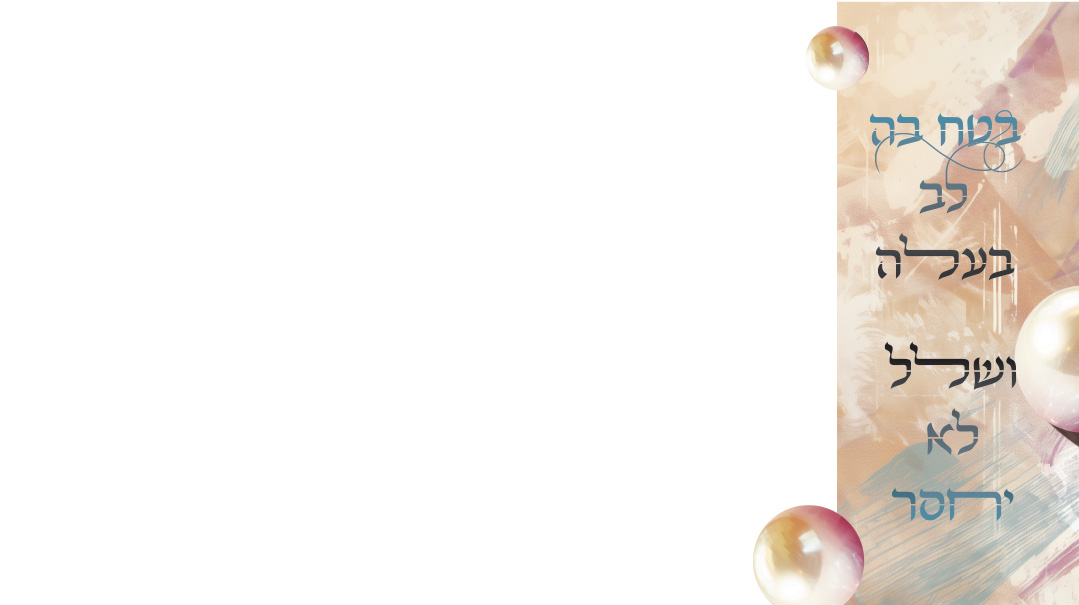Tasks Transformed
| July 23, 2024It takes a clear sense of self to envision a better you

גְּמָלַֽתְהוּ טוֹב וְלֹא רָע, כֹּל יְמֵי חַיֶּיהָ
Mrs. Shira Hochheimer sees Shlomo Hamelech’s timeless words as a guide to improving ourselves, which will in turn improve our relationship with our spouse and our children.
Married life involves doing a lot of chores. Some say everything should be divided 50-50 between husband and wife. I cook, he cleans, I do the school rush, he does bedtime. Others say that each spouse needs to put in 100 percent to make it a good relationship.
Doing household chores doesn’t have to just be a necessity for functioning, it can be a means to becoming an Eishes Chayil. Before you hate me, let me explain.
We know that doing chesed is a central and essential goal of Torah life. Rabi Simlai (Sotah 14b) points out that the Torah begins with chesed — one of the first stories in the Torah is of Hashem clothing Adam Harishon, even though he had just sinned — and ends with the chesed of Hashem burying Moshe Rabbeinu. In Ahavas Chesed, the Chofetz Chaim explains that by bookending the Torah with chesed, Hashem is highlighting that chesed is a primary goal of Torah.
Mitzvah 611 listed in the Sefer Hachinuch is the commandment of v’halachta bidrachav — to walk in His ways — to emulate HaKadosh Baruch Hu. Hashem, the model of goodness and compassion, is the objective standard for how to act.
Now we can look at the pasuk, “She does good for him [her husband], not bad, all the days of her life” as a guide for our approach to household chores:
Good — When we think about our lives as an opportunity to emulate Hashem Who constantly does chesed, our approach to all our household responsibilities shifts. I can transform regular chores into something holy. For example, If I’m preparing a hot drink for myself, I can make two, one for me, one for my husband, transforming having my morning coffee into a G-dly act.
For Him — Just as Hashem tailors what He does for each person based on their needs, so does the Eishes Chayil. I remember coming home from a speech as a newlywed and telling my husband, “The speaker said all husbands like X, Y, and Z.” My husband didn’t agree with the speaker, and I realized I needed to switch gears and do what he appreciated.
Not Bad — The Metzudas Dovid explains that the Eishes Chayil continues to be kind even if she has every reason to withhold her grace. This is in emulation of Hashem, Who doesn’t withhold anything from people, even when they sin. When He needs to guide us to act properly, it’s momentary, so we can improve. Sometimes, even my perfect husband can be in a bad mood. Instead of reacting angrily, we can still be kind. This isn’t being a pushover, it’s a G-dly act.
All the Days of Her Life — Finally, just as Hashem consistently cares for us throughout our life, we Neshei Chayil act this way all our life. The Malbim says there is a consistency and reliability to the Eishes Chayil’s kindness. When I was young and busy with kids, I needed to remind myself that my chores and chesed were a priority. Now that I’m older, my kids take care of themselves, and I’m working more, I still need to make my chores and chesed a priority.
When we choose to view our marriage as an opportunity to imitate Hashem, we transform our mundane tasks into opportunities. We stop thinking of marriage as a place to have our needs met, and it becomes a place where we become our best self.
Question: Are there any responsibilities that I can reframe as chesed and thus do them with more enthusiasm?
Shira Hochheimer is the author of Eishes Chayil: Ancient Wisdom For Women of Today, a presenter for Torat Imecha Nach Yomi, and an administrator for WITS in Baltimore, MD.
The Me I'm Proud to Be
Mrs. Debbie Greenblatt shows us what we can learn about a Jewish woman’s tremendous capabilities from Shlomo Hamelech’s descriptions of the Eishes Chayil, whatever stage of life she’s at.
Most decent people will repay good with good. You do something nice for me, you garner favor in my eyes, and next time you ask me for something, I’ll be inclined toward doing what you ask.
But this way of being inevitably leads to disappointment, as when I extend myself for someone else, I’ll also have an expectation that they will return the kindness, and that doesn’t always occur. And once we get into that tit-for-tat mode, what happens when someone wrongs me?
A higher plane of existence is when I can repay the good with good, and if someone wrongs me, I don’t feel like I have to respond negatively.
This is what Shlomo Hamelech is alluding to in our pasuk. Gemalas’hu tov — she repays the good, v’lo ra — and not the bad (Metzudas Dovid). The Eishes Chayil repays the good, and doesn’t feel a need to repay the bad that comes her way. Kol yemei chayeha — all the days of her life. When we feel wronged, we can often contain our aggravation in the moment, but it festers inside, and expresses itself at a later date, whether in bitter words or actions.
The Eishes Chayil is at peace with her approach; she doesn’t hold her upset inside, only to have it emerge later.
Where does that ability come from? It comes from having a clear picture of the person you want to become in This World, of what your highest self looks like, of the me I’ll be proud to be and know that Hashem is proud of as well. When that comes into focus, there’s a realization that letting someone else’s behavior dictate your conduct is too high a price to pay for someone else’s poor choices.
It’s not so difficult to look away from an occasional infraction. It becomes much more challenging when someone with whom you have to interact regularly behaves badly, and you frequently suffer the brunt of someone else’s shortcomings.
Rashi, on the first time the word tov appears in the Torah (Bereishis 1:4), explains that when Hashem divided the light to serve in the day and the dark at night, He saw that it was good, that each will function in their own domain. Hashem created boundaries. An important boundary with a person that you feel wrongs you is to identify in your own mind whom the issue belongs to. This is not your problem, it is theirs. You can’t make them behave differently; you can’t change them.
At the same time, you’re not stuck. Your choices include removing yourself from the situation when possible, and if that isn’t possible, you can choose not to personalize their actions or words, as that only adds to your pain. Instead, keep asking yourself — whom do I want to be in this situation? Even if you say to yourself, but what is going on here isn’t normal, you can still choose be the normal person in the scenario.
A strong Jewish woman with a clear sense of self can maintain the vision of whom she wants to become throughout her life and through all kinds of situations. This allows her to always repay with good not out of weakness or fear, but out of her conviction that she’s on the journey toward becoming her best self.
Debbie Greenblatt is a senior lecturer for the Gateways organization and a teacher of both the observant and the not-yet-observant. She is also director of education at Core.
Into the Tent
Mrs. Shira Smiles connects the pesukim of Eishes Chayil to the women in Tanach.
The Midrash teaches us that this pasuk refers to Rivkah Imeinu, who acted with kindness to Yitzchak Avinu after his mother passed away. It refers to the pasuk in Bereishis (24:67): “Vayevi’eha Yitzchak ha’ohelah Sarah imo vayikach es Rivkah vatehi lo l’ishah vaye’haveha vayinacheim Yitzchak acharei imo — Yitzchak brought [the girl] into his mother Sarah’s tent and he married Rivkah. She became his wife, and he loved her. Yitzchak was them consoled for the loss of his mother.”
Why does the Torah see it necessary to tell us that Yitzchak brought Rivkah into the tent before he even married her?
In Chayei Moshe, Rav Moshe Bick ztz”l explains that the tent represents the tzniyus— modesty. When Avraham Avinu invites his guests into his home, the Torah relates that they ate outside under the tree. The tent was the arena of Sarah Imeinu, protecting her from the outside world. Yitzchak Avinu first wanted to ensure that Rivka would aspire to the same level of tzniyus before he married her.
Rashi teaches us that there were three miracles that occurred within the tent of Sarah Imeinu. There was a candle that remained lit from Erev Shabbos until the following Erev Shabbos; the dough was blessed and always sufficed for family and guests; and a Divine cloud hovered over the tent. Yitzchak Avinu was thus comforted when he saw these three elements return with Rivkah Imeinu’s arrival. To Yitzchak, this meant that the mesorah would continue, keeping his mother’s legacy dynamic and vibrant.
These three elements, teaches Rav Shimshon Pincus ztz"l in Tiferet Shimshon, represent three fundamental aspects of a Jewish home. The lit candle is meant to bring shalom bayis. The blessing in the bread reflects a home that spends money wisely and prudently, as the woman of the home values and shares the essentials of living. This also allows her family to live with tranquility and not worry about debt. The Divine cloud over the tent symbolizes modesty within the home. This includes the way its members speak and interact with each other, with gentleness, kindness, and compassion.
The “great good” that an Eishes Chayil can achieve within her home is by following the model of Rivkah Imeinu. This is our objective: Foster the qualities of strong relationships, modest living, with consideration for others and serenity.
Rebbetzin Shira Smiles is a lecturer in the Yerushalayim area, and a mechaneches in Darchei Binah Seminary. Rebbetzin Smiles is the author of five books, Torah Tapestries, which include extensive essays on each parshah.
(Originally featured in Family First, Issue 903)
Oops! We could not locate your form.







